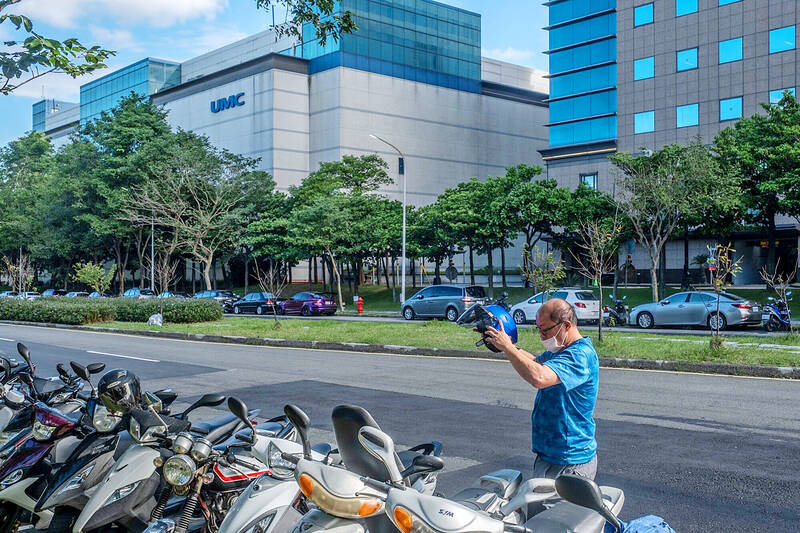Contract chipmaker United Microelectronics Corp (UMC, 聯電) yesterday reported that net profit last quarter declined 30.8 percent from a year earlier due to challenging macroeconomic conditions, a prolonged inventory correction and slow demand dragging down factory utilization.
Net profit plunged to NT$13.2 billion (US$421.7 million) last quarter, compared with NT$19.07 billion a year earlier. On a sequential basis, net profit contracted 17.4 percent from NT$15.97 billion, it said.
Earnings per share (EPS) dropped to NT$1.06 last quarter from NT$1.54 a year earlier and NT$1.29 the previous quarter.

Photo: Lam Yik Fei, Bloomberg
For the full year, net profit fell 30.2 percent to NT$61.44 billion from NT$88.02 billion in 2022, with EPS plunging to NT$4.93 from NT$7.09.
“Overall, 2023 was a year in which UMC demonstrated its resilience in the face of a challenging external environment, as an optimal product mix continued to lift blended average selling price by a mid-single-digit percentage year-on-year,” UMC copresident Jason Wang (王石) said during an investors’ conference.
Revenue last year shrank 10 percent to NT$222.53 billion, but the company expects it to pick up by 10 percent this year, in line with the foundry sector’s projected growth pace, but faster than the overall semiconductor industry’s growth of a mid-single-digit percentage, it said.
Still, its revenue projection is slower than the 20 to 25 percent growth forecast by its bigger rival, Taiwan Semiconductor Manufacturing Co (台積電).
Wang attributed the difference to a flattish addressable market.
“We are cautiously optimistic about this year,” he said. “The visibility is limited by macro uncertainty. Also, we are seeing lingering inventory issues for the automotive and industrial segments, although inventories at PC and mobile phone fronts have returned to healthy levels in the fourth quarter of 2023.”
The improvement in supply chain inventories has not translated into actual orders and revenue yet, as customers remain “cautious about restocking,” he said.
UMC expects wafer shipments this quarter to rise 2 to 3 percent sequentially, but factory utilization is likely to drop to the low-60 percent range from 66 percent last quarter, it said.
Gross margin is expected to fall to about 30 percent this quarter from 32.4 percent last quarter, the company said.
The blended average selling price is forecast to slip to 5 percent sequentially, but should hold steady for the rest of the year, it said.
Following its announcement last week that it was teaming up with Intel Corp to offer 12-nanometer chips from 2027, the company yesterday said it expects to see meaningful revenue contribution from this business that year.
The company expects to have process-design-kit ready for customers next year and to begin pilot production in 2026, Wang said.
UMC and Intel are to share the development costs for this project, he said.
The partnership with Intel comes as UMC aims to pursue cost-efficient capacity expansion and technology node advancement, Wang said.
The effort would broaden UMC’s addressable market and significantly accelerate its development roadmap, he said.
UMC has raised its projected capital expenditure to US$3.3 billion this year from US$3 billion, with a big chunk of the money going into 22-nanometer and 28-nanometer process technology capacity expansion.
It added that 28-nanometer technology was the biggest revenue contributor last quarter, accounting for 36 percent.

South Korea’s equity benchmark yesterday crossed a new milestone just a month after surpassing the once-unthinkable 5,000 mark as surging global memory demand powers the country’s biggest chipmakers. The KOSPI advanced as much as 2.6 percent to a record 6,123, with Samsung Electronics Co and SK Hynix Inc each gaining more than 2 percent. With the benchmark now up 45 percent this year, South Korea’s stock market capitalization has also moved past France’s, following last month’s overtaking of Germany’s. Long overlooked by foreign funds, despite being undervalued, South Korean stocks have now emerged as clear winners in the global market. The so-called “artificial intelligence

NEW IDENTITY: Known for its software, India has expanded into hardware, with its semiconductor industry growing from US$38bn in 2023 to US$45bn to US$50bn India on Saturday inaugurated its first semiconductor assembly and test facility, a milestone in the government’s push to reduce dependence on foreign chipmakers and stake a claim in a sector dominated by China. Indian Prime Minister Narendra Modi opened US firm Micron Technology Inc’s semiconductor assembly, test and packaging unit in his home state of Gujarat, hailing the “dawn of a new era” for India’s technology ambitions. “When young Indians look back in the future, they will see this decade as the turning point in our tech future,” Modi told the event, which was broadcast on his YouTube channel. The plant would convert

‘SEISMIC SHIFT’: The researcher forecast there would be about 1.1 billion mobile shipments this year, down from 1.26 billion the prior year and erasing years of gains The global smartphone market is expected to contract 12.9 percent this year due to the unprecedented memorychip shortage, marking “a crisis like no other,” researcher International Data Corp (IDC) said. The new forecast, a dramatic revision down from earlier estimates, gives the latest accounting of the ongoing memory crunch that is affecting every corner of the electronics industry. The demand for advanced memory to power artificial intelligence (AI) tasks has drained global supply until well into next year and jeopardizes the business model of many smartphone makers. IDC forecast about 1.1 billion mobile shipments this year, down from 1.26 billion the prior

People stand in a Pokemon store in Tokyo on Thursday. One of the world highest-grossing franchises is celebrated its 30th anniversary yesterday.